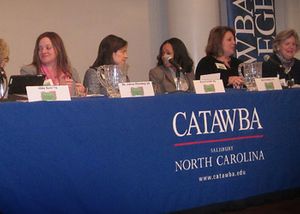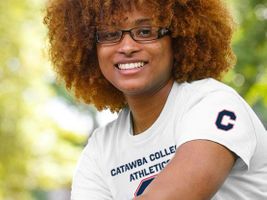
"I didn't see it coming," Salisbury attorney and Catawba College Trustee Mona Lisa Wallace told a gathering of Catawba female students. She was describing the gender inequity she encountered when fresh out of Wake Forest Law School she entered the workplace.
"No one would hire me to be a trial lawyer in 1979 in the South. They wanted to hire me to be a paralegal," explained Wallace, who today is a partner in the Salisbury firm, Wallace & Graham, which she established.
Wallace was one of seven female professionals who shared advice and lessons learned during a panel discussion, "Developing Emerging Professionals: What You Need to Know to Succeed," in Tom Smith Auditorium on February 17th. The inaugural event was sponsored by the Ketner School of Business and the Office of Career Services and moderated by Darlene Ball '62, a Catawba alumna and the first female chair of the college board of trustees. Panelists included Karen Kirks Alexander; Karen Gaskill '92; Rori Godsey '07; Kyna Grubb '89; Dr. Jolene Henning '96; Abby Hastings Kerr '72; and Wallace.
The panelists offered their perspectives on different workplace topics including equality, doing the right thing, self-confidence, networking and mentoring, making your own future, and balancing work, home, family and self.
Although the workplace inequities have improved for females since Wallace entered the workforce, disparities still exist, she said. She cited an October 2013 Pew Research study regarding workplace inequalities in society that showed women in 2012 still making only 84% of what their male counterparts make for the same work; an improvement over the 64% disparity Wallace encountered at the start of her career.
"The pay spread between men and women gets wider the longer you are in the workplace," she said, adding, "being a working parent makes it harder to advance in the job."
Despite women's hesitancy to push for raises and promotions, Wallace concluded, "We're sort of getting there." Rori Godsey, a 2007 Catawba alumna who works for F&M Bank as a senior customer service representative, teller coordinator and notary public, spoke about the importance of integrity and "the things you're willing to do when no one is watching."
She recalled her first job working at McDonald's in a food court at the Smithsonian Museum and the importance of wearing her uniform correctly and arriving to work on time. Her doing so allowed her to parlay this first job into an ongoing part-time job that helped her earn money throughout her college years. Later, after graduating from college, Godsey shared how working the early morning shift at a Salisbury fitness center turned into another job opportunity for her – this time at F&M Bank.
"I had no idea that I was on my job interview while I was folding towels or making coffee," Godsey said. "Don't be discouraged. Stick to your principles because somebody is always watching you."
Abby Kerr, a 1972 Catawba alumna, a college trustee and a financial adviser with Ameriprise Financial Services, echoed Godsey's advice regarding personal integrity. "Go beyond just what's legal – it's about being fair and honest in all you do," she said.
Kerr added, "The most important thing about being honest and principled is that it breeds respect and trust. Your reputation endures."
Salisbury Councilwoman Karen Kirks Alexander, the founder and president of KKA Architecture, P.A., explained that she took incremental steps to achieve her goal of being an architect. When she married and had her first child at an early age, she enrolled in community college and first became proficient in drafting.
When Alexander "realized it was a man's world" and she couldn't gain access to construction job sites to see how her drawings translated into steel and mortar, she spent Saturdays visiting construction sites. Accompanied by her young son, she took photographs at these construction sites to school herself on "how these parts went together."
Later she enrolled in college, earned her degree in architecture and took the final exam to become licensed in that field. "Set achievable goals," Alexander said. "Start small and increase these goals. It's necessary that you have excellence and that's how you achieve self-confidence. Fear can be harnessed as an extraordinary energy source that will give you self-confidence."
Kyna Grubb '89, executive director of Rowan Helping Ministries and a member of the Ketner School of Business Advisory Board, shared that "the best thing you can ever do is find a mentor, male or female."
"You grow when you help someone else grow," she said, recounting her journey from the corporate to the non-profit world. "Mentoring at work is affirming others."
Grubb explained that networking is also important, but should not be confused with pot-stirring in the workplace. Catawba alumna Karen Gaskill '92, a CPA who works as the payroll tax manager for Delhaize America, tried to dispel misconceptions about work. She encouraged the Catawba female students to "start out in an entry level position so you can learn and make mistakes."
"No job should be beneath you and no task too small. Catawba will prepare you for whatever it is as long as you do your part," Gaskill said.
She remembered aloud her first job which included making lots of copies -- a job she perfected -- and proof-reading audit reports. Her attention to detail "fast-tracked her job," while her coworkers, who were seemingly above performing menial tasks, sat at their desks waiting for something to do.
Dr. Jolene Henning, a 1996 Catawba alumna and chair of the Athletic Training Department at High Point University, spoke about striking a balance between her work and family.
"The media creates this idea of what it's supposed to be like [as a working woman], and it's not," Henning said. "There wasn't an example for me of how to do this. And this idea of balance shifts and the idea of a 40-hour week doesn't exist." Henning encouraged the students in the audience to "be fully present" in the moments of their lives and to "seek out connections because it takes village" for a working mother to have children and a family.
"My village has expanded tremendously," she shared since the births of her two daughters. "You can't do it alone. That was a hard lesson for me to learn, especially as a planner and a control freak.
"The self part of this is the part I struggle with the most," she confided. "I created this and what is the message I'm sending to my girls? 'Mommy is achieving her dreams and doing that because of her village.' "
